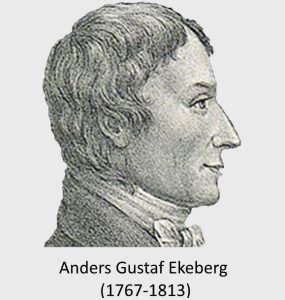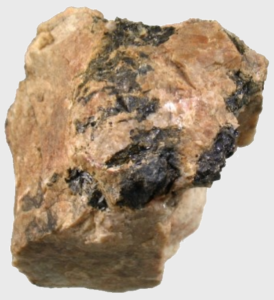the Tantalum-Niobium International Study Center (T.I.C.) : Who was Anders G. Ekeberg?
An international, non-profit association founded in 1974 under Belgian law.
- Metals: Tantalum (Ta)
- Read 366 Times
- Metals: Tantalum (Ta)
- Industries : ALL
Who was Anders G. Ekeberg?
 Anders Gustaf Ekeberg was born in 1767 in Sweden. He was a Swedish scientist, mathematician, and poet. He became a professor at Uppsala University in 1794 and initially made his name by developing advanced analytical techniques and by proposing Swedish names for the common chemical elements according to the principles set out by the “father of modern chemistry” Antoine-Laurent de Lavoisier.
Anders Gustaf Ekeberg was born in 1767 in Sweden. He was a Swedish scientist, mathematician, and poet. He became a professor at Uppsala University in 1794 and initially made his name by developing advanced analytical techniques and by proposing Swedish names for the common chemical elements according to the principles set out by the “father of modern chemistry” Antoine-Laurent de Lavoisier.
Ekeberg discovered the oxide of tantalum in 1802, isolating it from samples of two different minerals, specifically, tantalite from Kimito, Finland and yttrotantalite from Ytterby, Sweden.

(photo: e-rocks.com)
According to Ekeberg’s friend, the chemist Jacob Berzelius, Ekeberg chose the name ’tantalum’ partly to reflect the difficulties that he had experienced in reacting the new element with common acids and partly out of his passion for ancient Greek literature. Tantalus was a demi-god who killed and cooked his son, Pelops, and as punishment was condemned to stand in a pool of water beneath a fruit tree with low branches, with the fruit ever eluding his grasp, and the water always receding before he could take a drink.
Ekeberg suffered from poor health in later years and in February 1813 he died, unmarried, at the age of 46.
- Read 366 Times
- Metals: Tantalum (Ta)
- Industries : ALL
- Author: Tantalum-Niobium International Study Center (T.I.C.)
- Published Date: 10/03/2025
- The T.I.C. was established in response to concerns within the tantalum industry regarding the lack of useful information on tantalum source materials. The initial purpose of the T.I.C. was to spread information about tantalum and to promote the common interest and welfare of the producers, especially with public and private authorities, organisations and agencies. Since its foundation, the T.I.C. has grown to encompass niobium and all stages of the tantalum/niobium supply chains.
Advancing sustainability, technology, and industry collaboration since 1974.
Driving Global Innovation in Tantalum and Niobium
Connecting global innovators in tantalum and niobium, driving advancements from raw materials to cutting-edge applications.
- Supporting over 90 members across 30 countries.
- Promoting cutting-edge research and development.
- Facilitating a global network of professionals.
